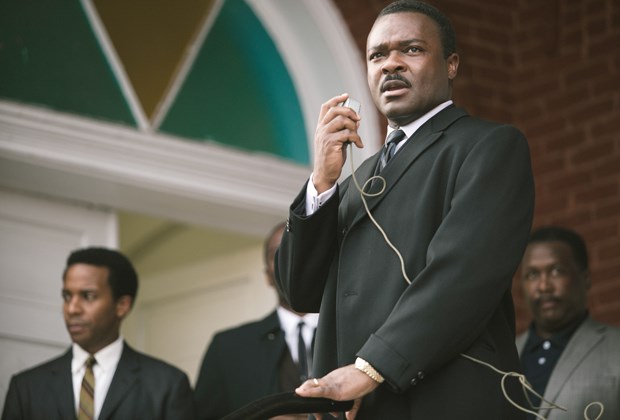Selma. Directed by Ava DuVernay. Starring David Oyelowo, Carmen Ejogo.Rating: 9 (out of 10).
Set for release a week before Martin Luther King day in the United States, Selma is a grim and powerful reminder of the one-step-forward-two-steps-back path to racial equality in America.
The film shows how much King achieved in his short life, but one look at the headlines debates how far we've actually come.
Ava DuVernay's film focuses on the post "I Have A Dream" era, specifically on a bloody three-month period in the south in 1965. A frustrated Martin Luther King (David Oyelowo) watches progress stall on his push for equal voting rights. The bill was shelved by President Lyndon Johnson (Tom Wilkinson) who had the Vietnam War on his hands, not to mention some angry white folks who thought that between desegregated schools and equal access to lunch counters African-Americans had already gained more than enough ground, thank you. "This voting thing is just going to have to wait."
But as the film shows, people are dying while they are waiting. The opening scene is the first lesson in a history primer: it shows Annie Lee Cooper (producer Oprah Winfrey) trying to register to vote - again - after being asked a string of ludicrous questions veiled as a "literacy test." Illuminating, the roadblocks that prevented African-
Americans from voting: potential voters had to be vouched for by a registered voter (impossible, if you were from a county where there were no black citizens on the registry); next, you had to pay a poll tax (prohibitively expensive for the majority of black voters); finally, if you achieved all that, your name and address was published in the newspaper, which held the threat of intimidation in the form of eviction, firing, mob violence and lynchings.
While the FBI listens in on King's phone calls, director J. Edgar Hoover (Dylan Baker) suggests a hit, and the president tries to guess his next move, MLK carefully ups the ante by moving demonstrations into Selma, Alabama, no random location. The activist's non-violent marches just weren't gathering enough attention from the Johnson administration; Selma was ripe for an explosion of white frustration, and front-page news coverage.
Englishman Tim Roth is somehow perfect to play slithery Alabama governor George Wallace, who famously announced "segregation now, segregation tomorrow and segregation forever!" A good ol' boy who refused to back down, he all but encouraged the violence on the Edmund Pettus bridge on March 7. Armed police mowed down 600 peaceful marchers with charging horses, tear gas and nightsticks bound with barbed wire. All was caught on the evening news, which forced Johnson's hand and resulted in the signing of the Equal Voting Rights act of 1965. "There is no Negro problem. There is no Southern problem. There is no Northern problem. There is only an American problem," the president declared.
We've all seen the footage from the bridge and recent cable-news specials, but never from this vantage point. We rarely see King's domestic struggles (with Carmen Ejogo, excellent, as Coretta Scott King), the in-fighting among civil rights groups, and the leader's vices (MLK smoked?).
The film succeeds because it isn't simply a narrative leading up to one or two powerful events, but offers a string of potent smaller moments, too. One such scene is when MLK calls and asks Mahalia Jackson to sing him some gospel for solace. And a quiet scene at the coroner's office between 82-year-old Cager Lee (Henry G. Sanders) and King may be the hardest of all to watch. "God was the first to cry for your boy," King says.
There are one or two too-generous scenes which pushes the film's running time to 2 hours 7 minutes, though it barely registers. Oyelowo is transformative, and happily the Oprah-led film that screamed Oscar from its inception is more



